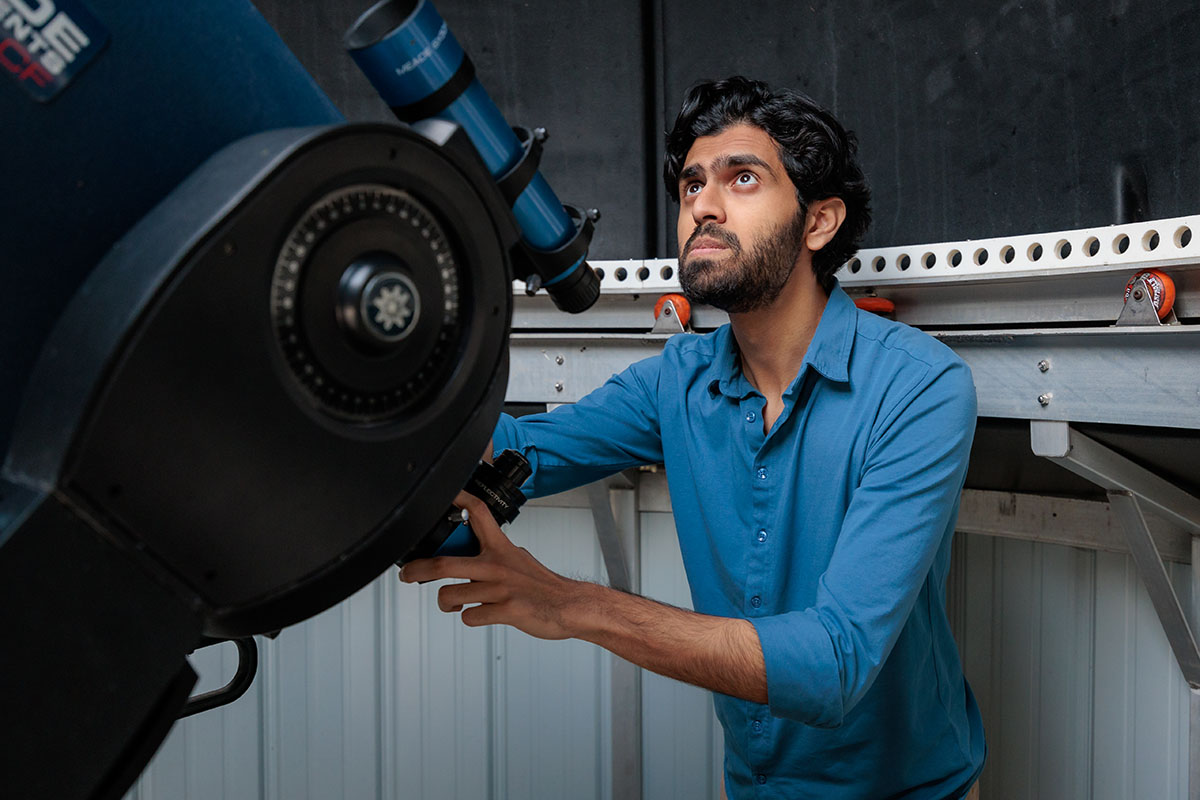
Mohamed Jassim Munavar Hussain ’25 made the discovery through an internship with the Massachusetts Institute of Technology, supported in part by the Center for Life Beyond Reed.
By Cara Nixon
February 24, 2025
“There are more worlds out there than we know,” Mohamed Jassim Munavar Hussain ’25 says. He’s a trusted source on that—he’s found some himself. In January, a paper he co-authored was published in The Astronomical Journal about his team’s discovery of eight new exoplanet candidates. If independently confirmed, these would become newly recorded additions to our galaxy’s known planetary systems.
As part of an internship with the Massachusetts Institute of Technology Kavli Institute for Astrophysics and Space Research, Jassim worked under the mentorship of Dr. Michelle Kunimoto to analyze data from NASA’s Transiting Exoplanet Survey Satellite (TESS), which searches for exoplanets using the transit method. This method detects dips in light around stars too far for us to see, and those dips in light can indicate a planet passing in front of the star, momentarily blocking the light. NASA uploads these thousands of data points to a publicly-available site, and Jassim developed a program designed to search for additional planets in known single-planet systems. He and Kunimoto discovered a high possibility that eight dips of light they observed could be planets.
The planet candidates Jassim and Kunimoto discovered are the second in their multi-planet systems, ranging in size from sub-Neptunes to one slightly smaller than Jupiter. In one of these systems, another research team found three more planets, which means if their findings are confirmed, it will be the 29th five-planet system found in our galaxy. Another one of Jassim and Kunimoto’s findings may mark the first known instance of a hot Jupiter system with a close-in giant companion—something considered extremely rare.
The Center for Life Beyond Reed helped fund Jassim for this work, including a trip to Boston to work with Kunimoto. Jassim credits Shania Siron and Marwa Al Khamees from CLBR in particular for their knowledge of networking, which he says helped him secure the internship. Guidance from Prof. Noah Charles [physics], he says, was invaluable as he sought out research opportunities. Jassim is grateful to Reed in general for instilling in him a work ethic that he consistently applies outside of the classroom.
The discovery of exoplanets help scientists and astronomers better understand our place in the universe. Even if the ones discovered by Jassim and his team turned out not to be planets, the discovery is still key for knowing more about celestial bodies that exist in space.
For his thesis, Jassim is focusing on exploring the Earth-ionosphere system as a waveguide, advised by Prof. Darrell Schroeter ’95 [physics]. After he graduates from Reed, he plans to attend graduate school for engineering, with the ultimate goal of becoming an astronaut.
Jassim sums up his astronomy journey with one phrase in Arabic: Alhamdulillah, or “praise be to God.” “Exploring and appreciating God’s creations in the vastness of space is at the core of my work as a physicist and astronomer,” Jassim says. “Everything I achieve is a blessing from God, and I can’t do anything without it.”